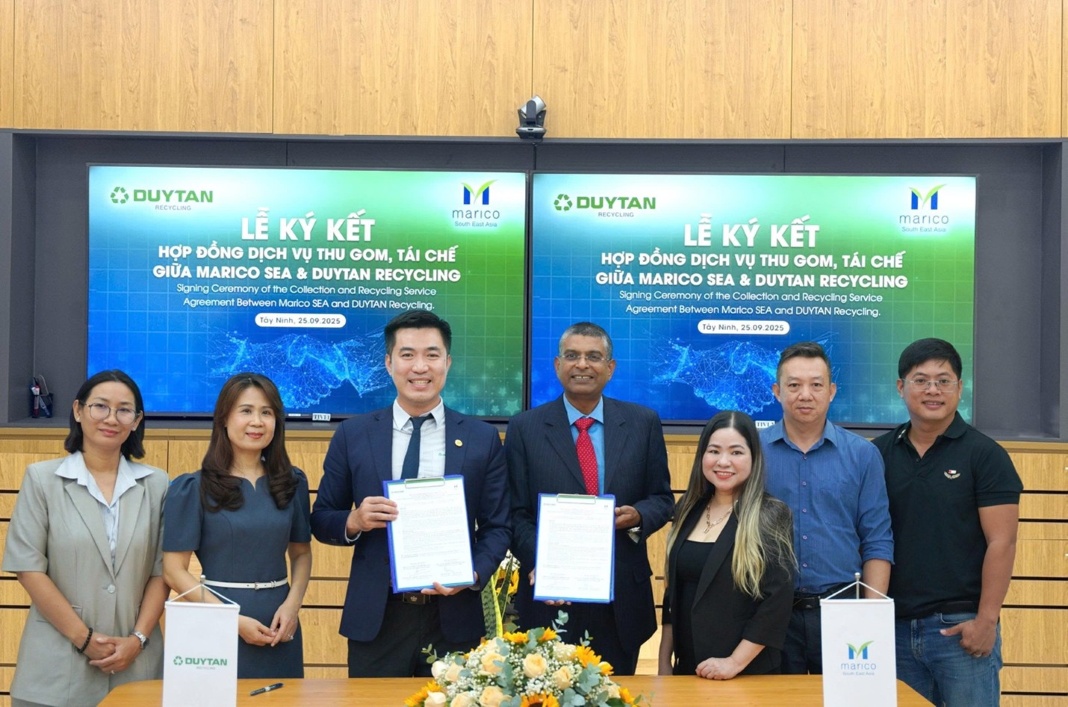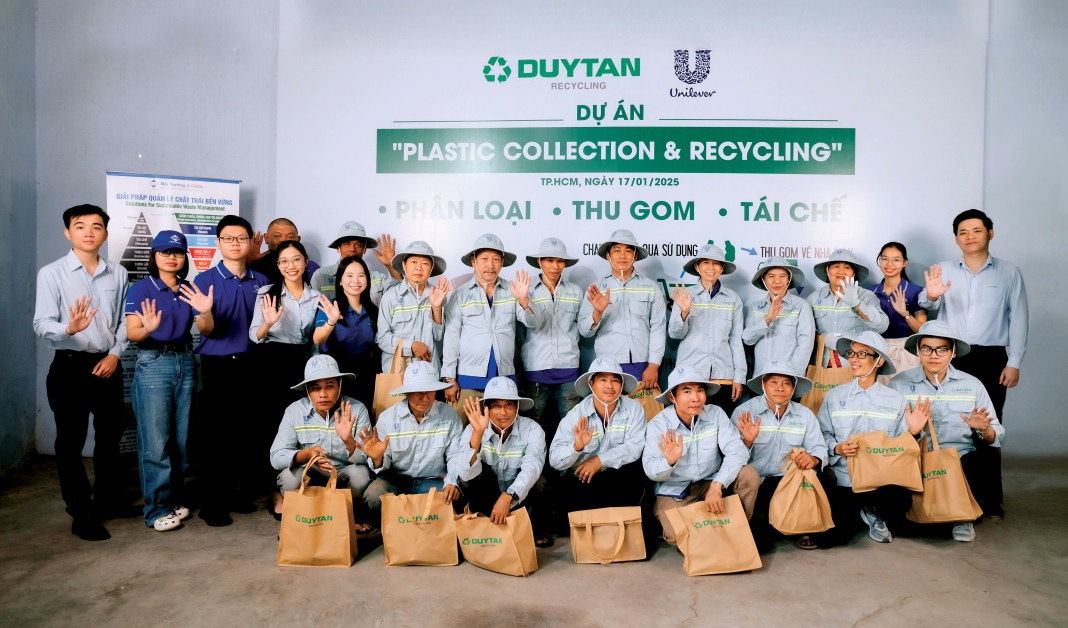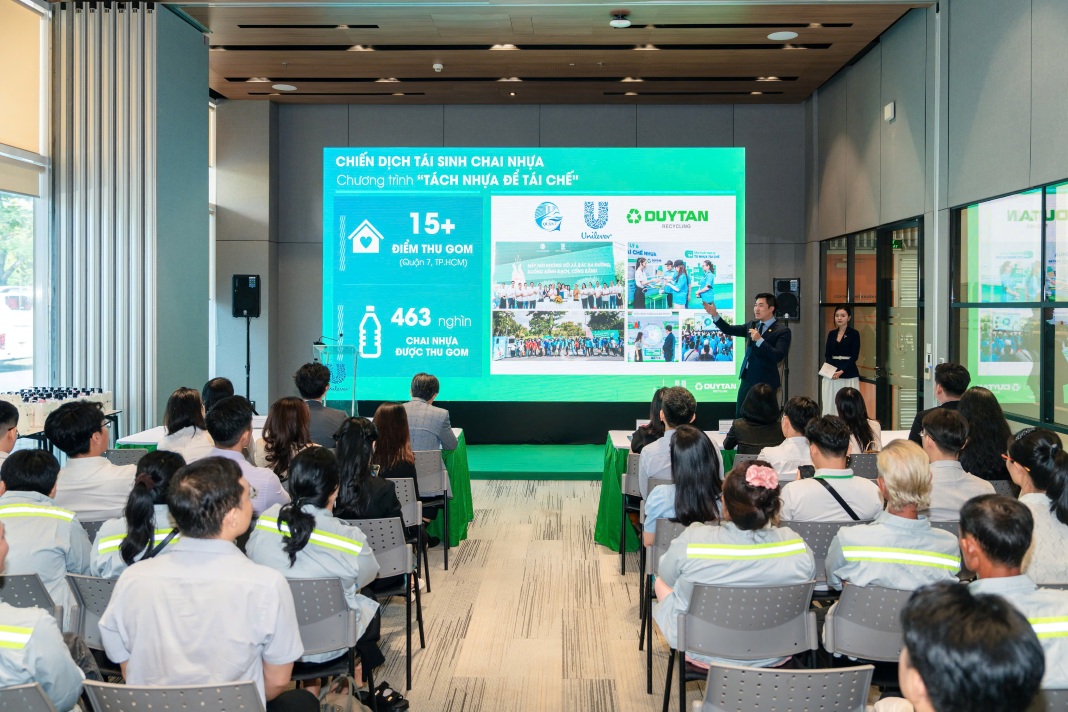The year 2025 marks a pivotal moment for DUYTAN Recycling (DTR) in expanding its mission to “revive” used plastic. Through a series of initiatives that promote the circular economy, the company’s efforts are not only improving the efficiency of Vietnam’s recycling industry but also generating meaningful social impact.
From national standards to global certification
The “circle of plastic rebirth,” as The Saigon Times once described DTR’s work in 2024, has grown wider and stronger in 2025 — not just in scale or community impact, but also in the standards that define recycled plastic production.
A major milestone came with the introduction of Vietnam’s first National Standard for Recycled Plastic Materials. After 10 months of collaboration between DTR, the Vietnam Standards and Quality Institute, and the Vietnam Plastics Association, the Ministry of Science and Technology established a technical framework to regulate the domestic rPET market.
This new standard provides recyclers with clearer targets, enhances competitiveness across the sector, and builds consumer confidence in recycled products made in Vietnam. It also creates a foundation for international integration, as local recyclers can now align more easily with global practices.
Beyond domestic standards, DTR has continued to prove its capacity to meet stringent international benchmarks. Its “bottle-to-bottle” PET recycling process was certified in compliance with EU Regulation 2022/1616, one of Europe’s most demanding standards for recycled plastics used in food packaging. The regulation requires strict quality management and traceability across the entire production chain — from input to output. Notably, the Department of Science and Technology of Long An Province (now merged into Tay Ninh Province) became the first agency in Vietnam to be recognized by the EU as qualified to assess recycling processes under this regulation.
In July 2025, DTR achieved another milestone by completing the carbon footprint verification for three recycled plastic lines — rPET, rHDPE, and rPP — conducted by Bureau Veritas Vietnam in accordance with ISO 14067:2018. The assessment was based on real operational data from the factory, covering the entire process from raw materials to the factory gate.
Quantifying the carbon footprint of recycled plastics provides a powerful message: recycling doesn’t just manage waste — it actively reduces greenhouse gas emissions compared to producing virgin plastic. By giving plastic a “new life,” DTR is directly contributing to Vietnam’s carbon reduction goals in a measurable and sustainable way. Moreover, transparent carbon data offers valuable insights for policymakers, helping shape future regulations that support a circular economy model for the entire manufacturing sector.
Expanding the “Circle of Rebirth”
In 2025, DTR’s “Circle of Rebirth” continues to expand, not only through technological progress but also through meaningful partnerships that extend the reach of its social and environmental impact.

In September, DTR signed a strategic partnership agreement with Marico SEA, the fast-moving consumer goods (FMCG) company behind the X-Men brand. The two sides aim to collect and recycle 190 tons of plastic waste — equivalent to about 14.6 million bottles — in 2025 alone. This collaboration is implemented under Vietnam’s Extended Producer Responsibility (EPR) regulation, which requires producers and importers to take responsibility for recycling packaging and products after consumer use.
The EPR law, effective January 1, 2024, mandates producers of batteries, lubricants, tires, and packaging (including plastic and paper) to ensure the recycling of their post-consumer waste. Earlier last year, the Ministry of Agriculture and Environment announced a list of 24 qualified recycling units, among which DTR was selected to handle PET, HDPE, and PP packaging, converting them into recycled pellets for industrial use.
In parallel, DTR continues to collaborate with long-term partners to deepen its social contributions. The “Plastic Collection & Recycling” project with Unilever Vietnam, now in its second year of a five-year plan, has achieved remarkable results. To date, the initiative has collected and recycled over 15,000 tons of plastic waste, halfway to its 30,000-ton target.

But the project’s impact extends beyond waste reduction. It has improved working conditions for 1,100 informal waste workers across more than 20 collection hubs through training on waste sorting and the provision of protective equipment. This social dimension — supporting workers who form the backbone of Vietnam’s recycling network — reflects DTR’s belief that sustainability must include people as much as materials.
Building the foundation for a circular future
DTR’s 2025 journey demonstrates that true corporate sustainability goes beyond production efficiency or technological achievements. By helping set Vietnam’s first recycling standards, earning international certifications, quantifying carbon benefits, and fostering inclusive partnerships, the company has woven environmental progress with social responsibility.
Each recycled pellet from DTR carries more than environmental value — it represents trust, collaboration, and the vision of a greener, fairer future. Through its expanding “circle of rebirth,” DTR is laying a stronger foundation for Vietnam’s circular economy — one where reducing plastic waste also means empowering communities and redefining what responsible growth looks like.









